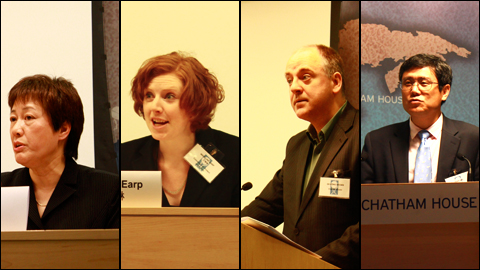Chinese media students from Goldsmiths attending a prestigious conference at Chatham House said they had hope for more media freedom in China. But this was not a unanimous position. An ELL reporting team covered the event described as “The Mandarin Seminar”:
The conference was hosted by the BBC Chinese service at Chatham House(Royal Institute of International Affairs) on 3rd of June.

photo: Xixi Zheng - from left to right: Dr Yuwen Wu, Ms Madeline Earp, Dr Kerry Brown and Mr Zhang Jing
The conference was divided into two parts. Dr Yuwen Wu(Editor, bbcchinese.com), Mr. Zhang Jing(Managing editor, East Asia and Pacific Division, Voice if America), Ms. Madeline Earp(Asia Programme Senior researcher, Committee to Protect Journalists) and Dr. Kerry Brown(Director, Asia Programmes, Chatham House) gave speeches in the first part of the meeting; the second part of the meeting was delivered by Mr. Chen Yan(Head of Chinese, Radio France International), Professor Hugo de Burgh(Director, China Media Center, University of Westminster), Mr. Raymond Li(Head, BBC Chinese Service), Professor Yu Ligong(Shih Hsin University, Taiwan) and Professor Zhang Xiaoling(School of Contemporary Chinese Studies, University of Nottingham).

photo: Xixi Zheng - from left to right: Mr Chen Yan, Mr Raymond Li, Professor Hugo de Burgh, Professor Yu Ligong and Professor Zhang Xiaoling
Mr. Zhang Jing provided an evaluation of contemporary media freedom. He said the state of media freedom in China is as disturbing as it is complex.
Ms. Madeline Earp reported on CPJ (Committee to Protect Journalists) research:
China has topped the CPJ list of countries which jail the most journalists for over a decade, challenged only once by Iran. Most of the 34 journalists recorded in prison during CPJ’s December 2010 census were freelancers who wrote online articles. CCP(Chinese Communist Party) and government mechanisms censor print, broadcast and online media, and restrict foreign journalists, their local assistants, and especially domestic journalists.
Raymond Li, said most people working in Chinese international broadcasting are facing different degrees of constraints and restrictions in all respects:
In general, we face severe challenges on different fronts, including loss of audience, diminishing market influence, restrictions in news gathering and serious shortage of financial resources.
Mr. Li, appointed head of BBC Chinese since July 2009, gave media students some suggestions at the end of the meeting:
He said the purpose for this seminar was to try to put forward some new thinking and constructive suggestions for reform:
…get our friends here to make proposals on the future development of and work together for the revival of Chinese international broadcasting.
Videos by Shiliu Peng.





